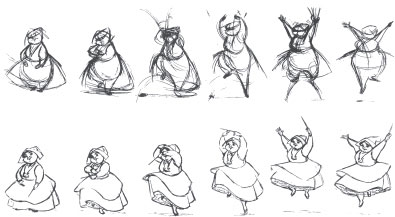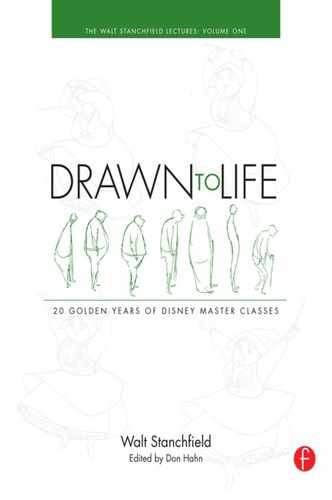24 Simplicity for the Sake of Clarity
Ian Steele, our Tuesday night model, said a very significant thing to me after the session. He said after holding a pose for some minutes he no longer had that fresh, intense feeling for the pose that he had when he first assumed it. That is something that happens in all phases of life. First love is so strong and exhilarating after 30 years of marriage that feeling diminishes (or is gone). The first bite of some delicious food tastes so vivid — after munching on it for half an hour, the taste almost disappears. Likewise the artist, when he first gets an inspiration or tackles a pose in an action analysis class sees the pose, is struck by its clarity and its expressiveness, then after working on it for a while that first impression is gone and with it goes any chance of capturing it on paper. That’s the reason we should learn to get that first impression down right away — while it’s fresh, while it’s still in that first impression stage — before it starts to fade.
Any of you who have studied Zen will be familiar with the practice of seeing everything anew constantly. You don’t dig up the past and use it to make judgments on the present — everything is new, there is only now, this moment, so each moment has that first impression newness. Applied to drawing each moment reveals the pose as if you had just seen it for the first time. Every stroke you make with the pencil is like a knife-edge that carves out the pose as if it were the first time you ever saw it.
The reason I keep harping on “forget the detail” for this particular type of study is that the detail doesn’t buy you anything at this stage of the drawing. Doodling with detail will cause you to lose that first impression. The time to study bone structure and muscles is in anatomy class or at home with a good book on anatomy. In an action analysis class a rough circle is all you need to locate and suggest a knee or an elbow or a wrist. Two lines is all you need to locate and suggest the various parts of the arms and legs — preferably one of them straight and the other curved. The straight one is used on the stretch side and the curved one used on the squash side.
When I say locate and suggest, that is exactly what and all you need. What you are drawing is a pose not parts. The simplest kind of suggestion is the surest way to a good drawing.
I have xeroxed a little series of drawings from The Illusion of Life to show how an extremely simple sketch can express so much and thereby be a perfect basis for the final drawings. Notice how the hands and feet were not ignored in the sketches. As a matter of fact they are a dominant element of the poses.
Keep it simple and expressive.

